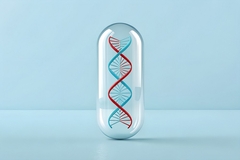Drinking sugary beverages increase the risk for fatal liver disease says study, while experts question its methods

09 Aug 2023 --- A study of nearly 99,000 postmenopausal women throughout two decades has found an 85% increased risk of developing liver cancer and a 68% increased risk of chronic liver disease mortality when consuming one sugar-sweetened beverage daily compared to those consuming less than three monthly.
However, due to the study being observational, skepticism is being expressed by other scientists, pointing out many factors to consider when reviewing the results.
“To our knowledge, this is the first study to report an association between sugar-sweetened beverage intake and chronic liver disease mortality,” says Dr. Longgang Zhao, first author of the study and a researcher at the Brigham’s Channing Division of Network Medicine, Boston, US.
If confirmed, Zhao says that the findings, published in JAMA, may pave the way for a public health strategy to reduce the risk of liver disease.
Dr. Duane Mellor, a registered dietitian and senior lecturer at Aston Medical School, England, notes that the study only considered sugar-sweetened drink consumption at the start of the study, “so changes in intake were not recorded, and as types and sugar content of soft drinks has varied over the past 20 years, this could mean that this study may not accurately reflect the participants’ sugar intake over the 20 year follow up period.”
“The authors acknowledge that other potential causes of liver cancer and chronic liver disease such as hepatitis infections were not recorded in the study, and due to limited data on liver disease, they could only consider liver cancer and deaths from liver disease,” asserts Mellor.
Self-reported study
The women reported their consumption of sugary soft and fruit drinks, excluding fruit juice, and after three years, the reports included consumption of artificially sweetened beverages.
The participants also self-reported liver cancer prevalence from chronic diseases such as hepatitis, cirrhosis and fibrosis. The reports were then verified by the National Death Index and medical records.
 Of the 98,786 women, 6.8% consumed a sugary beverage daily and showed an 85% higher risk of liver cancer. Of the 98,786 women, 6.8% consumed a sugary beverage daily and showed a 68% higher risk of fatal chronic liver disease and an 85% higher risk of liver cancer. The authors note that this was compared to those consuming less than three of these types of beverages per month.
Of the 98,786 women, 6.8% consumed a sugary beverage daily and showed an 85% higher risk of liver cancer. Of the 98,786 women, 6.8% consumed a sugary beverage daily and showed a 68% higher risk of fatal chronic liver disease and an 85% higher risk of liver cancer. The authors note that this was compared to those consuming less than three of these types of beverages per month.
Mellor says it’s important to note that this association was only seen when comparing those who drank sugar-sweetened drinks daily and those who drank them fewer than three times monthly.
“When comparing those who drank up to six sugar-sweetened drinks per week and those drinking fewer than three drinks per month, no associated increase in risk was seen.”
“It is also perhaps interesting that no relationship was seen in women who drank artificially sweetened drinks daily and those who drank them fewer than three times per month and liver disease or cancer.”
Skepticism continues
Tom Sanders, professor emeritus of Nutrition and Dietetics, King’s College London, England, says that the 20-year follow-up data used in the study was initially designed to test a low-fat diet at risk of breast cancer.
He further argues the leading causes of chronic liver disease and liver cancer are infection with hepatitis viruses, particularly hepatitis B or C and that viral hepatitis can be acquired from contaminated blood or sexual intercourse.
“A history of alcohol abuse is strongly linked to the development of fatty liver, cirrhosis and liver cancer. Metabolic dysfunction-associated steatotic liver disease (or non-fatty liver disease) is associated with obesity, especially in the presence of Type 2 diabetes, has become much more prevalent in recent years in the US and is becoming a significant cause of liver cancer.”
“High intakes of sugar do increase the amount of fat stored in the liver in experimental animals, so the effect of sugar-sweetened beverages might be causal, providing enough sugar is consumed. However, the top level of intake reported was more than one serving a day – such as more than 30 grams daily – which does not seem much given average intakes are 100-120 grams daily.”
Sanders says the authors have “attempted to adjust for the limitations in the study” but points out there might be undisclosed alcohol abuse or hepatitis infection related to the lower socioeconomic status of those reporting higher intakes of sweetened drinks. Mellor argues that the authors did not adjust the data enough for other known factors that increase the risk of liver disease, such as alcohol.
Mellor argues that the authors did not adjust the data enough for other known factors that increase the risk of liver disease, such as alcohol.
“It is also notable that the self-reported prevalence of Type 2 diabetes was three times higher in those consuming the most sugar-sweetened drinks compared to the reference group,” he adds.
Limiting intake
Mellor argues that the authors did not adjust the data enough for other known factors that increase the risk of liver disease, such as alcohol.
“The association with sugar-sweetened drinks disappears when variables including alcohol are added to the model for deaths caused by chronic liver disease. Although when the same approach is applied to liver cancer, the risk associated with liver cancer and sugar-sweetened drinks remains,” Mellor underscores.
Recent research has found that drinking even small amounts of alcohol increases the risk of hypertension and cardiovascular disease.
“Although this study may show an increased risk associated with daily sugar-sweetened drink intake and death from liver disease and liver cancer, the relationship is unclear. However, this does not take away from the general public health message that sugar-sweetened drinks are associated with increased risk of weight gain and problems with oral health,” says Mellor.
“So, although this study does not provide clear evidence of increased risk of liver-related disease and sugar-sweetened drinks, we know from other evidence looking at other aspects of health that we should continue to restrict our intake of these products.”
By Beatrice Wihlander












